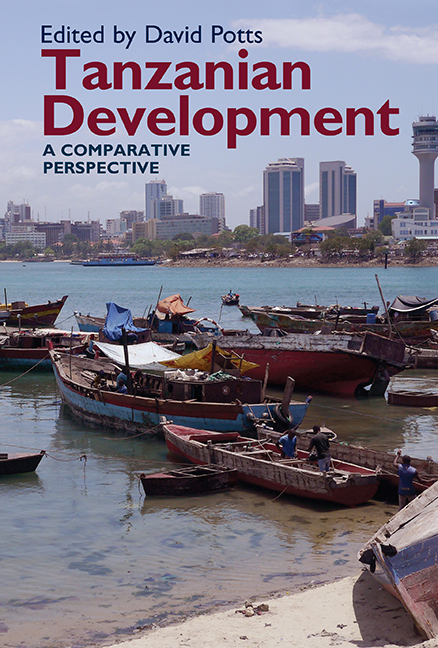Book contents
- Frontmatter
- Contents
- List of Illustrations
- Contributors
- Acknowledgements
- 1 Introduction – Tanzanian Development: A Comparative Perspective
- 2 The Political Economy of Tanzania 1967–2017: Reimagining the State
- 3 Reflections on the Tanzanian Trajectory: Decline and Recovery
- 4 Agricultural Development in Tanzania
- 5 Assets and Poverty Dynamics: The Methodological Challenges of Constructing Longitudinal Surveys in Tanzania
- 6 Contract Farming in Tanzania: Experiences from Tobacco and Sunflower
- 7 ‘We Just Sell Water – That is All We Do’: Two Cases of Small-scale Irrigation in Tanzania
- 8 The Industrial Development of Tanzania in Comparative African Perspective
- 9 Competitiveness in African Manufacturing: Some Evidence from Tanzania
- 10 ‘Good Life Never Comes Like Dreams’: Youth, Poverty and Employment in Arusha
- 11 International Aid to Tanzania – with some comparisons from Ghana and Uganda
- 12 Real Exchange Rate Changes and Export Performance in Tanzania and Ethiopia
- 13 Economic Leakage as a Constraint on Tourism's Effective Contribution to Local Economic Development in Tanzania
- 14 Extractive Industry Revenues and their Expenditure in Local Government Authorities: The Case of the Gold Service Levy in Geita District Council in Tanzania
- 15 Conclusion
- References
- Index
5 - Assets and Poverty Dynamics: The Methodological Challenges of Constructing Longitudinal Surveys in Tanzania
Published online by Cambridge University Press: 24 October 2019
- Frontmatter
- Contents
- List of Illustrations
- Contributors
- Acknowledgements
- 1 Introduction – Tanzanian Development: A Comparative Perspective
- 2 The Political Economy of Tanzania 1967–2017: Reimagining the State
- 3 Reflections on the Tanzanian Trajectory: Decline and Recovery
- 4 Agricultural Development in Tanzania
- 5 Assets and Poverty Dynamics: The Methodological Challenges of Constructing Longitudinal Surveys in Tanzania
- 6 Contract Farming in Tanzania: Experiences from Tobacco and Sunflower
- 7 ‘We Just Sell Water – That is All We Do’: Two Cases of Small-scale Irrigation in Tanzania
- 8 The Industrial Development of Tanzania in Comparative African Perspective
- 9 Competitiveness in African Manufacturing: Some Evidence from Tanzania
- 10 ‘Good Life Never Comes Like Dreams’: Youth, Poverty and Employment in Arusha
- 11 International Aid to Tanzania – with some comparisons from Ghana and Uganda
- 12 Real Exchange Rate Changes and Export Performance in Tanzania and Ethiopia
- 13 Economic Leakage as a Constraint on Tourism's Effective Contribution to Local Economic Development in Tanzania
- 14 Extractive Industry Revenues and their Expenditure in Local Government Authorities: The Case of the Gold Service Levy in Geita District Council in Tanzania
- 15 Conclusion
- References
- Index
Summary
Introduction
This chapter reports on a particularly Tanzanian research project into the consequences of economic growth for rural poverty. The project explores the poverty dynamics apparent in changing asset portfolios of rural families in Tanzania from the late 1980s onwards (and mainly the 1990s and 2000s). At the time of writing we are half way through data collection for this project. This chapter focuses on the methodological challenges that we have found.
The project is particularly Tanzanian in three important ways. First, it addresses a specifically Tanzanian aspect of debates about poverty dynamics and economic growth and the data deficiencies surrounding both. Second, it is a risky project but is most likely to succeed in a place like Tanzania. The risks arise from its deceptively simple method. We revisit families who were surveyed by researchers in the 1990s, we reinterview them paying particular attention to changing asset bundles, and we explore the reasons behind any changes in prosperity and poverty that we find. However, locating the surveys requires the strong research networks that Tanzania affords, as described in this chapter. The final reason why this is a particularly Tanzanian project is that undertaking this work entails getting to grips with problems of asset ownership and family dynamics that are the bread and butter of rural research in Tanzania.
Our argument is that assets matter when exploring the long-term dynamics of poverty, prosperity and livelihood. By assets we mean, inter alia, land, livestock, houses, household goods and farming implements. Some recent analyses also include education as an asset, blurring the boundaries between social capital and assets (Young 2012). Assets matter because local definitions of what it means to be rich or poor hinge on the bundles of assets to which families have access, and their effective use (see the descriptions in Table 5.1). They capture aspects of poverty and wealth that matter to rural communities. Many measures of poverty, such as poverty lines, which are derived from measures of weekly expenditure, and debates about poverty dynamics around those lines, overlook assets. They may miss important aspects in rural life for that reason. We also argue, however, that measuring change in assets is hard, and we explore the reasons for that in this chapter.
- Type
- Chapter
- Information
- Tanzanian DevelopmentA Comparative Perspective, pp. 95 - 115Publisher: Boydell & BrewerPrint publication year: 2019

